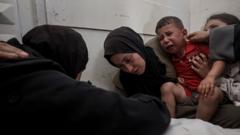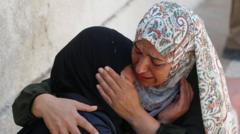The recent killing of humanitarian workers in Gaza has drawn significant international condemnation and raised serious questions regarding the conduct of military actions in conflict zones.
Violence Against Humanitarian Workers in Gaza Sparks Outrage

Violence Against Humanitarian Workers in Gaza Sparks Outrage
UN Accusations Against Israel Intensify Amid Findings of Multiple Gunshot Wounds in Bodies of Aid Workers
The deaths of 15 humanitarian workers, highlighted by reports from the Palestinian Red Crescent Society, have stirred global outrage. According to officials, the bodies found in a mass grave displayed multiple gunshot wounds, with one paramedic reportedly found with his limbs bound. This situation escalated after the UN accused Israel of responsibility for the fatalities, leading to international outcry against such violence against aid personnel.
On March 23, in the southern Gaza city of Rafah, Israeli military actions allegedly targeted ambulances and a UN vehicle that subsequently went silent. The recovery operation of the bodies revealed them alongside crushed ambulances, further substantiating claims made by the Palestine Red Crescent Society. Nebal Farsakh, a spokeswoman for the organization, stated that the evidence showed the workers had been shot, with their bodies treated with extreme disregard, raising significant ethical concerns over military operations in civilian areas.
In response, an Israeli military spokesperson dismissed the accusations, claiming that those killed included Palestinian militants and that the military acted upon identifying what they described as "suspicious" vehicles approaching their positions. This claim has been met with skepticism amidst the backdrop of a humanitarian crisis exacerbated by the ongoing conflict, emphasizing the urgent need for dialogue and accountability in a region marred by violence.
The tragic loss of these aid workers not only underscores the dangers faced by those providing assistance in conflict zones but also calls into question the rules of engagement and the paramount importance of protecting civilians and humanitarian organizations. The international community is faced with the challenge of responding to such incidents in a manner that insists upon accountability while advocating for the safety and security of all humanitarian personnel.
On March 23, in the southern Gaza city of Rafah, Israeli military actions allegedly targeted ambulances and a UN vehicle that subsequently went silent. The recovery operation of the bodies revealed them alongside crushed ambulances, further substantiating claims made by the Palestine Red Crescent Society. Nebal Farsakh, a spokeswoman for the organization, stated that the evidence showed the workers had been shot, with their bodies treated with extreme disregard, raising significant ethical concerns over military operations in civilian areas.
In response, an Israeli military spokesperson dismissed the accusations, claiming that those killed included Palestinian militants and that the military acted upon identifying what they described as "suspicious" vehicles approaching their positions. This claim has been met with skepticism amidst the backdrop of a humanitarian crisis exacerbated by the ongoing conflict, emphasizing the urgent need for dialogue and accountability in a region marred by violence.
The tragic loss of these aid workers not only underscores the dangers faced by those providing assistance in conflict zones but also calls into question the rules of engagement and the paramount importance of protecting civilians and humanitarian organizations. The international community is faced with the challenge of responding to such incidents in a manner that insists upon accountability while advocating for the safety and security of all humanitarian personnel.






















